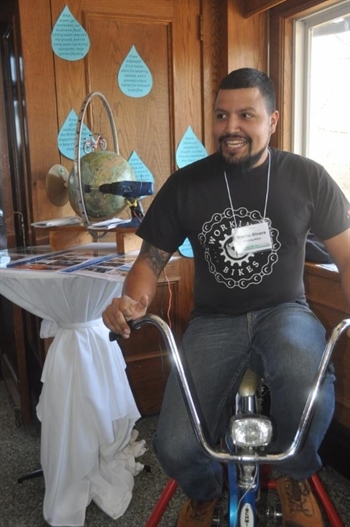
Go Green Wilmette
Go Green Wilmette participant Trudy Gibbs and Wilmette Village President, Bob Bielinski peruse Skidmore Owings & Merrill's Great Lakes Century Vision Plan.
 By Josh Ellis and MPC Research Assistant Daniel Wolf
By Josh Ellis and MPC Research Assistant Daniel Wolf - March 17, 2015
On Sunday, March 8, the community group Go Green Wilmette held its ninth annual fair to raise awareness in the community about environmentalism and sustainability with this year’s theme being “Water Matters.” Wilmette, like a lot of other communities in the Chicago area, has been experiencing flooding in recent years. I (Metropolitan Planning Council Research Assistant Daniel Wolf) wanted to see what kinds of stormwater solutions Wilmette is looking into and what other communities can learn from their experience.

Go Green Wilmette
Go Green Wilmette collaborated with the Chicago nonprofit Working Bikes to collect donated bicycles and components.
I showed up at the event with several garbage bags of clothing, an old bicycle, and a variety of broken electronic devices that I was able to jettison responsibly through Go Green Wilmette’s recycling program. I became engrossed in a participatory map of butterfly habitat corridors, assembled by residents who had landscaped their gardens using native plants that attract insects and other pollinators. But the highlight of the fair was an exhibition by Chicago Architects, Skidmore Owings & Merrill: the Great Lakes Century Vision Plan.
I found myself feeling optimistic—possibility even excited—upon seeing the exhibit’s spectacular floor-to-ceiling satellite images of North America with text in English and French. The project calls on communities throughout the Great Lakes Basin from Chicago to Toronto to think beyond international boundaries; to reimagine commerce and recreation so as to protect, profit, and take pleasure in what is an exceptional resource.

Go Green Wilmette
Wilmette kids participate in a recycling program as part of Water Matters 2015.
One way to move toward that goal is to take better care of the rainwater that falls in and around the Great Lakes. Whereas the 20th Century urban landscape of paved surfaces and enormous concrete pipes tends to sweep stormwater directly into the nearest river or lake along with the plethora of pollutants picked up along the way; a new approach, namely green infrastructure, seeks to allow stormwater to soak slowly into the ground by incorporating vegetation. Solid evidence suggests integrated green infrastructure is better for the environment, cheaper and more pleasant to live next to than traditional gray infrastructure alone. But plans to implement green infrastructure on a large scale in Wilmette and elsewhere in the Chicago area are few and far between. Some of the presenters at Water Matters shed light on the issue.
Municipal officials and other stormwater management professionals often aren’t sure of the costs to maintain green infrastructure features throughout their useful life, nor the environmental benefits they deliver. To implement a large-scale public water management project, a cost-benefit analysis is often necessary, whereas the flood alleviation provided by green infrastructure can be difficult to quantify. Also locations ideal for siting green infrastructure are often currently in use as recreational facilities, requiring a difficult tradeoff.
Much of the land within communities like Wilmette lies on private property, which means that installing rain gardens or planting native plants depends on the homeowner to take action. But because homeowners aren’t always aware of the reduction in flooding a rain garden could provide, nor the incentive programs that are available in several communities, these opportunities aren’t always taken advantage of.
Sometimes rain gardens aren’t enough to stem flooding at adjacent homes, like when a neighbor changes the grading of their lot or a nearby business installs a paved parking lot without taking measures to keep stormwater on site. Better permit programs and zoning ordinances may be necessary to prevent these kinds of activities.
Managing stormwater is a complicated and difficult task and there is no silver bullet to remedy every facet of the problem. I find it encouraging that despite these challenges, Wilmette officials are considering a variety of solutions with an open mind. In the words of Al Swanson, Village Trustee and Land Use Committee Chair:
“The entire Chicago metropolitan region is struggling with managing stormwater to minimize damage from flooding and deliver the rain into the soil where it can do the most good. Green infrastructure does exactly that and must be part of every community’s stormwater management inventory.”
The Metropolitan Planning Council is also working diligently on stormwater management solutions. We’re collaborating with the Ill. Environmental Protection Agency to prioritize investments in both green and gray infrastructure through the State Revolving Loan Fund and the Ill. Green Infrastructure Grant program. With the Chicago Metropolitan Agency for Planning, MPC is developing a stormwater management template that communities in Northeastern Illinois can adapt to prioritize and invest in local green and grey infrastructure improvements. MPC has also been assisting Chicago’s Logan Square neighborhood and the south suburb of Blue Island with demonstration projects that are involving private property owners and showcasing how green infrastructure can help reduce flooding, and, if well designed, transform underutilized spaces into attractive community assets. As Chicago area stormwater management practices go green one community at a time, we may soon see a comprehensive vision for the Great Lakes region become a reality.
MPC Research Assistant Daniel Wolf wrote this post.